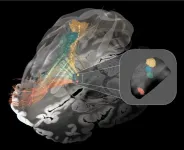(Press-News.org) Study finds guided parent-child discussions are effective at addressing subtle racism
When parents discuss racism with their children, negative biases toward Black people are significantly reduced in both parent and child
EVANSTON, Ill. --- Experts have long pointed out the need for white parents to have conversations that directly address racism with their children to reduce racial bias. But many parents fail to have these crucial discussions.
Psychology researchers at Northwestern University have published the first study to demonstrate the immediate effectiveness of a guided discussion task to promote parent-child conversations about racial bias in white U.S. families.
The researchers created a discussion guide that would support parents to have “color conscious” conversations with their children that would explicitly acknowledge the existence and history of racism, and its continued presence.
According to the study, parents who engaged in color conscious discussions with their 8- to 12-year-old child showed a significant decrease in anti-Black bias, and so did their children. However, even in conversations in which parents made comments that downplayed the importance of race or deflected blame away from white perpetrators of racism, the researchers saw reductions in bias.
“A lot of parents worry that talking to their kids about racism could increase their children’s biases, and they also feel like they don’t know how to do it,” said corresponding author Sylvia Perry. “Our key finding, however, was that when parents used color conscious language while discussing interpersonal racism, it was associated with a significant decrease in their child’s negative implicit biases toward Black people.”
Perry is an associate professor of psychology and principal investigator for the Social Cognition and Intergroup Processes Laboratory at Weinberg College of Arts and Sciences, and a faculty fellow at the Institute for Policy Research at Northwestern.
Perry said two questions prompted the research. First, if white parents and their children participated in a guided racism discussion task, would they have color conscious conversations? Second, if white parents and their children did have color conscious conversations, would children show a measurable decrease in their anti-Black biases following the conversation?
Guided discussion as a tool
The researchers recruited 84 self-described white parent-child pairs to participate in the study.
Parents were asked to start a conversation with their child after watching videos that depicted interactions between a white child and a Black child. The series of scenes featured overt prejudice, subtle prejudice or neutral interactions between the children. Parents were provided with suggested discussion prompts such as, “Why did the white child do what they did?” and “How do you think the Black child felt after it happened?” — intended to encourage parents and children to articulate whether racial prejudice had occurred and to consider the negative impact of racism on Black children.
Parents and children individually completed implicit association tests to measure their degree of anti-Black bias before and after the guided discussion task.
Study findings
The researchers were surprised to find that even when parents used colorblind language in discussing the videos with their children, for example, saying, “Black and white people are all the same,” their children still showed reductions in their biases; the effects were just smaller.
Perry noted, however, that the observed decreases occurred while parents and children were participating in a guided racism discussion task designed to mitigate prejudice. While some families used colorblind language at some point during their discussion, most of those families also used color conscious language. Overall, 92% of parents and 95% of children, used color conscious language during the discussion.
The children's anti-Black biases showed a significant decline after completion of the discussion task. Children showed a moderate preference for white over Black individuals, with an implicit bias score of 0.41 before the task. After the discussion task, the score was reduced to 0.16, bringing them closer to little or no bias. Parents’ anti-Black biases also decreased significantly, from 0.53 to 0.34, after the discussion task.
Addressing subtle prejudice
Because subtle forms of prejudice have negative effects on the mental and physical health of Black individuals the researchers said it is a lost opportunity for parents to engage only in conversations about blatant racism.
“We specifically found beneficial effects of parents’ language on their children’s anti-Black biases when they were discussing subtle instances of racism,” said Deborah Wu, an assistant professor of psychology at Stonehill College, and a co-author of the study. “Our results suggest that having these specific color conscious conversations, as well as refraining from explaining away racism is especially helpful when discussing subtler forms of racism. This is especially important, as subtle forms of racism are far more common than overt racism and more likely to be dismissed by white individuals.”
The researchers found that parents who made clear to their children that the white child’s racial prejudice was influencing the white child’s attitudes or behaviors toward the Black child, such as feeling uncomfortable around Black children, had children who were most likely to show a reduction in negative biases towards Black people.
Two-way influence
The researchers also looked at the influence children had on their parent’s attitudes. They found that when children made external attributions, such as saying a child might be prejudiced because they learned it from their parents, their parents showed bigger reductions in their anti-Black biases.
“Another key takeaway of this study is that it demonstrates the utility of family-level racism interventions to reduce racial bias in both adults and children,” said Jamie L. Abaied, an associate professor of psychological science at the University of Vermont and a co-author of the study. “The experience of viewing and discussing vignettes depicting racism alongside one’s child may be particularly eye-opening for white parents, and it may help them grapple with the idea that if they do not take steps to prevent it, their own child could potentially engage in racist behaviors like the white children in the videos.”
"White Parents' Racial Socialization During a Guided Discussion Predicts Declines in White Children's Pro-White Biases" will be published by the journal Developmental Psychology on Feb. 22. Access it online here.
END
Study finds guided parent-child discussions are effective at addressing subtle racism
When parents discuss racism with their children, negative biases toward Black people are significantly reduced in both parent and child
2024-02-22
ELSE PRESS RELEASES FROM THIS DATE:
Entrepreneurs’ stock losses bruise their businesses
2024-02-22
When a recession takes a bite out of an entrepreneur’s personal stock portfolio, does that person’s business suffer more than those of older and larger competitors?
New research by Marius Ring, assistant professor of finance at Texas McCombs, finds a link between the wealth of small-business owners and the health of their companies during economic downturns. When their stock portfolios lose value, their businesses suffer ripple effects: less financing and curtailed hiring.
“Entrepreneurial wealth follows the ups and downs of economic cycles,” Ring says. “I show that for entrepreneurs whose stock portfolios take a hit, their businesses ...
Copies of antibiotic resistance genes greatly elevated in humans and livestock
2024-02-22
DURHAM, N.C. – Biomedical engineers at Duke University have uncovered a key link between the spread of antibiotic resistance genes and the evolution of resistance to new drugs in certain pathogens.
The research shows bacteria exposed to higher levels of antibiotics often harbor multiple identical copies of protective antibiotic resistance genes. These duplicated resistance genes are often linked to “jumping genes” called transposons that can move from strain to strain. Not only does this provide a mechanism for resistance to spread, having multiple copies of a resistance ...
Study shows how local fishers respond to climate challenges
2024-02-22
BEAUFORT, N.C. – When it comes to protecting a crucial resource in the face of changing conditions, it’s important to know how the humans reliant on that resource have organized themselves. Especially if there isn’t a lot of government supervision.
A new study of small-scale fisheries in Mexico’s Gulf of California has found that the fishers’ response to a changing climate can be strongly influenced by what they fish for and how they’re organized. The work appears in the January 2024 issue of Global Environmental Change.
“When we ...
Cooler, wetter parts of Pacific Northwest likely to see more fires, new simulations predict
2024-02-22
CORVALLIS, Ore. – Forests in the coolest, wettest parts of the western Pacific Northwest are likely to see the biggest increases in burn probability, fire size and number of blazes as the climate continues to get warmer and drier, according to new modeling led by an Oregon State University scientist.
Understanding how fire regimes may change under future climate scenarios is critical for developing adaptation strategies, said the study’s lead author, Alex Dye.
Findings were published today in JGR Biogeosciences.
Dye, ...
U.S. Department of Energy awards Argonne National Laboratory $4 million for energy-efficient microchip research
2024-02-22
While the microchips inside electronic devices like cell phones and computers are incredibly small, transistors — the tiny electrical switches inside of microchips — are approaching the atomic level. Today’s microchips pack over 100 million transistors in an area the size of a pin head.
Despite their almost unimaginable size, the total number of such microelectronic devices consume an enormous amount of energy, which is growing exponentially. Predictions indicate that 20% of the world’s energy could be consumed ...
Less invasive early lung cancer study receives Top 10 Clinical Research Achievement Award
2024-02-22
A Weill Cornell Medicine-led research team has been awarded a 2024 Top 10 Clinical Research Achievement Award from the Clinical Research Forum in recognition of an influential 2023 New England Journal of Medicine study on early-stage lung cancer resection.
The award is one of 10 given annually by the Clinical Research Forum for highly innovative and clinically translatable research with the potential to provide major benefits to patients. The Washington, D.C.-based organization is an influential advocate for government funding of clinical research and the interests of American clinical research institutions generally. The winners will present their award-winning ...
Releasing “brakes” in the brain
2024-02-22
When certain connections in the brain do not function correctly, disorders such as Parkinson’s disease, dystonia, obsessive-compulsive disorder (OCD), and Tourette’s syndrome may result. Targeted stimulation of specific areas in the brain can help alleviate symptoms. To pinpoint the exact therapeutic target areas of the brain, a team led by researchers from Charité – Universitätsmedizin and Brigham and Women’s Hospital analyzed data from patients across the globe who had undergone implantation of tiny electrodes to stimulate ...
JMIR Publications celebrates 25 years of publishing health research
2024-02-22
Join Gunther Eysenbach, the founder, CEO, and executive editor of JMIR Publications, in this new video as he reflects on the company's 25th anniversary and its remarkable journey in the scholarly publishing industry. Eysenbach discusses the inception of the Journal of Medical Internet Research and the driving forces behind creating an open access eHealth journal. He emphasizes the significance of innovation both in content and form, highlighting the company's early adoption of internet-based technologies ...
How discrimination, class, and gender intersect to affect Black Americans’ well-being
2024-02-22
URBANA, Ill. – Black Americans experience racial discrimination as a chronic stressor that influences their quality of life. But it exists in conjunction with other social factors that may modify the impact in various ways. A new study from the University of Illinois Urbana-Champaign explores how discrimination, gender, and social class affect individual well-being and relationship quality for Black Americans.
“It’s well documented that discrimination negatively impacts individual quality of life, but research on how it affects relationships is mixed. Some studies find it has a negative effect, others that it has no effect, and some even find a positive effect, ...
Compound vital for all life likely played a role in life’s origin
2024-02-22
Compound vital for all life likely played a role in life’s origin
A chemical compound essential to all living things has been synthesised in a lab in conditions that could have occurred on early Earth, suggesting it played a role at the outset of life, finds a new study led by UCL researchers.
The compound, pantetheine, is the active fragment of Coenzyme A. It is important for metabolism - the chemical processes that maintain life. Earlier studies failed to synthesise pantetheine effectively, leading to suggestions that it was absent at life’s origin.
In the new ...
LAST 30 PRESS RELEASES:
Brainwaves of mothers and children synchronize when playing together – even in an acquired language
A holiday to better recovery
Cal Poly’s fifth Climate Solutions Now conference to take place Feb. 23-27
Mask-wearing during COVID-19 linked to reduced air pollution–triggered heart attack risk in Japan
Achieving cross-coupling reactions of fatty amide reduction radicals via iridium-photorelay catalysis and other strategies
Shorter may be sweeter: Study finds 15-second health ads can curb junk food cravings
Family relationships identified in Stone Age graves on Gotland
Effectiveness of exercise to ease osteoarthritis symptoms likely minimal and transient
Cost of copper must rise double to meet basic copper needs
A gel for wounds that won’t heal
Iron, carbon, and the art of toxic cleanup
Organic soil amendments work together to help sandy soils hold water longer, study finds
Hidden carbon in mangrove soils may play a larger role in climate regulation than previously thought
Weight-loss wonder pills prompt scrutiny of key ingredient
Nonprofit leader Diane Dodge to receive 2026 Penn Nursing Renfield Foundation Award for Global Women’s Health
Maternal smoking during pregnancy may be linked to higher blood pressure in children, NIH study finds
New Lund model aims to shorten the path to life-saving cell and gene therapies
Researchers create ultra-stretchable, liquid-repellent materials via laser ablation
Combining AI with OCT shows potential for detecting lipid-rich plaques in coronary arteries
SeaCast revolutionizes Mediterranean Sea forecasting with AI-powered speed and accuracy
JMIR Publications’ JMIR Bioinformatics and Biotechnology invites submissions on Bridging Data, AI, and Innovation to Transform Health
Honey bees navigate more precisely than previously thought
Air pollution may directly contribute to Alzheimer’s disease
Study finds early imaging after pediatric UTIs may do more harm than good
UC San Diego Health joins national research for maternal-fetal care
New biomarker predicts chemotherapy response in triple-negative breast cancer
Treatment algorithms featured in Brain Trauma Foundation’s update of guidelines for care of patients with penetrating traumatic brain injury
Over 40% of musicians experience tinnitus; hearing loss and hyperacusis also significantly elevated
Artificial intelligence predicts colorectal cancer risk in ulcerative colitis patients
Mayo Clinic installs first magnetic nanoparticle hyperthermia system for cancer research in the US
[Press-News.org] Study finds guided parent-child discussions are effective at addressing subtle racismWhen parents discuss racism with their children, negative biases toward Black people are significantly reduced in both parent and child





